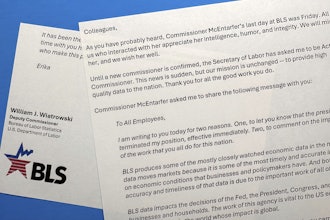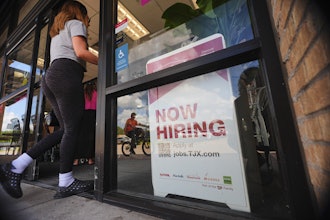Technology has the power to change the way we think. It has the power to change the way we create, and the way we interact with our world. It has completely altered our products, our workplaces, and our modes of communication. And it has shaped entire generations, defined cultures, and reimagined industries.
Today, technology is the driving force behind change in the manufacturing industry. We see it in everywhere we look. Paper has been replaced by touch screens. Meetings are conducted via Skype instead of face to face. Factories are more measured, more data driven, more agile, and more nimble than ever before. Artificial intelligence and robots are now a part of our daily lives.
There is no doubt that these advancements have brought disruption, and cost to manufacturing. But the rise of technology in our industry has been vital in keeping us competitive and essential for sustaining the industry in the future.
Manufacturing is more efficient, productive, and adaptable today than it was twenty years ago. There’s a greater understanding of what happens on the plant floor, with more real-time data to guide decision making. With new software and technology, we’re seeing our industry reach new levels of performance that we couldn’t have imagined even a decade ago.
Today, many factories are upping their performance by operating like video games. Gamification is taking the industry by storm, with systems designed to align with the natural motivations that people have to make a difference, and be recognized in how they drive plant floor performance. Increasing transparency and tracking achievements by individual user or teams has resulted in huge gains in efficiency for some companies. When contributions are seen by peers and managers, this motivates those people to continue to problem solve and innovate. When properly designed, gamification is making employees more engaged, productive, and happier.
But most importantly, gamification and technology are opening the door to connect with a younger generation, who quite frankly, haven’t shown much interest in the manufacturing industry to date.
When we look at the data on available jobs in the manufacturing industry, it’s sobering to say the least. According to The Manufacturing Institute, 3.5 million manufacturing jobs will need to be filled over the next ten years. Two million of those jobs will go unfilled. Not thousands. Two million. This is a wake-up call for our industry.
At my company, we read the statistic from The Manufacturing Institute and wanted to figure out why more Americans are not pursuing careers in manufacturing. We were also interested to see if there were any differences in perspectives by generation. We commissioned Engine, a survey provider, to poll 1,002 Americans demographically representative of the United States at a 95 percent confidence level. Responses were then grouped by generation, Baby Boomers (born between 1946-1964), Generation X (born between 1965-1980), and Millennials (born between 1981-1998).
We were shocked by how significantly the responses varied by generation. When asked whether respondents agreed or disagreed that manufacturing jobs are important to the U.S. economy, 86 percent of both Baby Boomers and Generation X agreed. In comparison, only 68 percent of Millennials agreed that manufacturing is critical to our economy.
We then asked respondents about the supply of skilled workers in the U.S., and again observed differences by generation. Sixty percent of Baby Boomers and 63 percent of Generation X agreed that there is a shortage of skilled workers in the U.S. In contrast, only 51 percent of Millennials agreed that there is a shortage.
Lastly, we asked respondents if they agreed that the manufacturing industry offers fulfilling careers. Fifty nine percent of both Baby Boomers and Generation X agreed. To our surprise, only 49 percent Millennials agreed. That’s less than half of the younger generation who believe our industry offers desirable or satisfying opportunities. This is a test for our industry, because our future workforce depends on what we do today to reach the younger generation.
The truth is, our industry hasn’t done a great job at connecting with younger audiences about what makes manufacturing compelling or exciting. Other industries have, such as the tech sector. According to the Bureau of Labor Statistics, computer and information jobs are expected to grow by 12 percent during the period of 2014-2024. This is the fastest growth rate of all other occupations for that time period.
It may surprise Millennials that not only does manufacturing offer opportunities to work with cutting-edge technology, but it also offers competitive pay to the tech sector. According to Glassdoor, the average base pay of a Manufacturing Supervisor is $64,118, and for a Manufacturing Engineer, the average is $71,679. For a Director of Manufacturing, the average base pay is $146,412. For a generation known for its record-setting student debt, this is a powerful message to convey.
As an industry, we have to be more vocal in sharing the exciting technology opportunities in manufacturing. Ongoing developments in artificial intelligence, robotics, automation, integration, gamification, and real-time data are what interest Millennials and what will connect our industry to younger generations. We must share the facts and data at the conferences we attend, on our websites, in our presentations at schools and universities, and in all of our recruitment efforts. Two million unfilled jobs is no small matter. Now is the time to shout from the rooftops.
Technology is leading the manufacturing industry to new frontiers. If we do it right, we can bring the younger generation along with us in being a part of expanding manufacturing in the U.S. And if our technology can join forces with Millennial interests and skillsets, our industry will flourish.
Tyler Whitaker is CTO & COO of Leading2Lean.
1https://www.themanufacturinginstitute.org/~/media/827DBC76533942679A15EF7067A704CD.ashx/
2http://techgenix.com/millennials-tech-careers/
3https://www.glassdoor.com/Salaries/manufacturing-supervisor-salary-SRCH_KO0,24.htm
4https://www.glassdoor.com/Salaries/manufacturing-engineer-salary-SRCH_KO0,22.htm
5https://www.glassdoor.com/Salaries/director-of-manufacturing-salary-SRCH_KO0,25.htm























